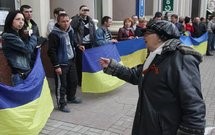 There was hardly any good reason to expect any significant agreement to work together for de-escalation of the mounting tension by the four participants - US, Russia, EU, and Ukraine - at the Geneva Conference held on April 17. But, observers were puzzled when it was announced that there was agreement to work towards de-escalation: illegally formed armed groups will be disbanded; occupied government buildings, squares, and streets will be vacated; protesters who surrender weapons and vacate sites of protests will be pardoned; and a constitutional reform to give more powers to regional governments will be initiated.
There was hardly any good reason to expect any significant agreement to work together for de-escalation of the mounting tension by the four participants - US, Russia, EU, and Ukraine - at the Geneva Conference held on April 17. But, observers were puzzled when it was announced that there was agreement to work towards de-escalation: illegally formed armed groups will be disbanded; occupied government buildings, squares, and streets will be vacated; protesters who surrender weapons and vacate sites of protests will be pardoned; and a constitutional reform to give more powers to regional governments will be initiated.
It looked too good to be true. The first inkling of trouble came when President Obama soon after the signing of the agreement in Geneva expressed doubt about Russia’s willingness to comply sincerely and threatened severe sanctions in case of non-compliance. Obviously, President Obama did not want to wait a while to figure out how Russia was going to behave. Perhaps, he wanted to make sure that the Geneva accord would not hold. The reason for such a conjecture is that it was the US that torpedoed the February 21st accord signed with the then President Yanukovych, an accord that has many elements in common with the Geneva accord.
We do not know whether Russia is sincere and serious about the Geneva accord. The day before the Conference, German Chancellor Merkel phoned up President Putin and he told her that Ukraine was moving towards a civil war. He must have asked her about her stand on economic sanctions on Russia. She might have told him that her preference was to use diplomacy rather than confrontational sanctions. We can only guess what exactly was said.
But we do know that there is a divide between US and EU about the wisdom and desirability of imposing harsh economic sanctions on Russia. In any such confrontation, EU stands to lose much more than the US, though it can be argued that Russia will be the worst loser. There are 6000 German firms working in Russia. Russia supplies 25% or more of gas consumed by EU through pipelines passing through Ukraine. While US would like to replace Russia as a supplier of gas by 2020 when it becomes a net exporter of energy, it is not clear that EU wants to put all its eggs in the US basket.
A poll has indicated that only 35% of Germans and French want to get tough with Russia over Ukraine. In UK, the percentage is higher at 45. Historians will remember the 1922 Treaty of Rapallo signed between Soviet Union and the Weimar Republic. Germany was able to circumvent the limitations put on its armament by the Treaty of Versailles by carrying out certain tests in Russia. In turn, Germany helped the Red Army to organize itself. Germans have a guilt complex towards Russia for having invaded it causing the death of 25 million. However, a brazen invasion of Ukraine by Russia might not leave Germany with any option but to confront Russia with stiff economic sanctions.
It is unlikely that Russia has serious plans to invade Ukraine. Russia knows the enormous economic cost of such an invasion. It also knows that in military terms NATO is incapable of coming to Ukraine’s rescue without starting a war in Europe. There is no reason to believe that EU or even US really wants a war. Yet, US, and perhaps Russia too, are prepared to play brinkmanship and it is not beyond the realm of possibility that there can be a war that nobody wanted.
The key question is, why is the US doing what it is doing? There are clear signals that neo-cons have a say in determining policy towards Russia; they want to resurrect the Cold War. The even more intriguing question is , why is President Obama who advocated a peaceful approach when he came to the White House six years ago now letting the neo-cons such as Victoria Nuland in the State and Samantha Power, PR in New York, control policy? It appears that neo-cons want to escalate tension hoping that Finland and Sweden will ask to join NATO. Having been Ambassador to Finland ,I doubt whether Finland will ask to join NATO.
Russia wants Finlandization of Ukraine. If US does not agree, and if there is a move to take Ukraine into NATO, Russia might stage yet another ritual of referendum-independence- request to join Russia.
The US is a fast declining superpower and the world is no longer unipolar. Yet, the international financial world is still unipolar and controlled by the US. However, if the US unilaterally punishes Russia by invoking financial sanctions, the divide between US and EU will be exposed. The incident in Slovansk in eastern Ukraine when three Russian speakers were killed is a troubling indicator of what can happen. The interim government in Kiev is perhaps neither willing nor able to disarm the right wing armed groups. The Russian speakers up in revolt in the east have said that they won’t be the first to disarm. The prospects for serious de-escalation are bleak indeed. Vice President’s visit under way now (22nd April) might ‘reassure’ Kiev, but it will not help in finding a way out.
By Special Arrangement with The Institute for Defence Studies and Analyses (www.idsa.in)